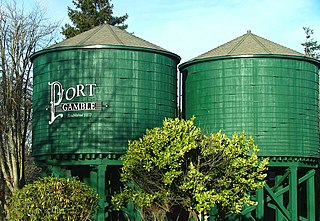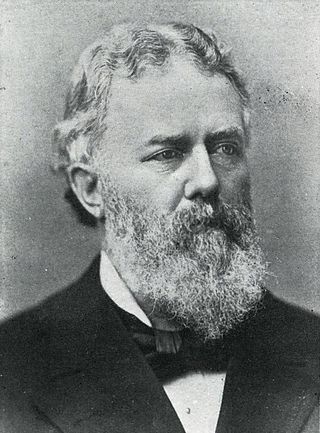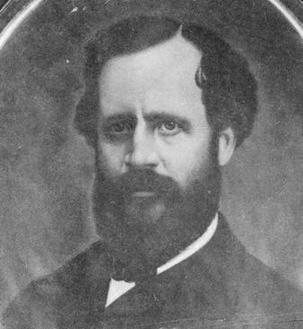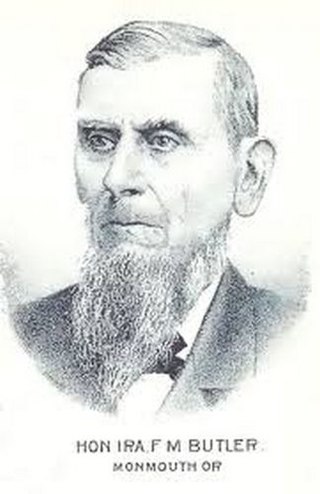Related Research Articles
The Territory of Oregon was an organized incorporated territory of the United States that existed from August 14, 1848, until February 14, 1859, when the southwestern portion of the territory was admitted to the Union as the State of Oregon. Originally claimed by several countries, Spanish "El Orejón" was part of the Territorio de Nutca (1789-1795), later in the 19th century, the region was divided between the British Empire and the US in 1846. When established, the territory encompassed an area that included the current states of Oregon, Washington, and Idaho, as well as parts of Wyoming and Montana. The capital of the territory was first Oregon City, then Salem, followed briefly by Corvallis, then back to Salem, which became the state capital upon Oregon's admission to the Union.

The Territory of Idaho was an organized incorporated territory of the United States that existed from March 3, 1863, until July 3, 1890, when the final extent of the territory was admitted to the Union as Idaho.

Ezra Morgan Meeker was an American pioneer who traveled the Oregon Trail by ox-drawn wagon as a young man, migrating from Iowa to the Pacific Coast. Later in life he worked to memorialize the Trail, repeatedly retracing the trip of his youth. Once known as the "Hop King of the World", he was the first mayor of Puyallup, Washington.

Port Gamble is an unincorporated community on the northwestern shore of the Kitsap Peninsula in Kitsap County, Washington, United States. It is also a small, eponymous bay, along which the community lies, near the entrance to Hood Canal. The unincorporated communities of Port Gamble and Little Boston, part of Kitsap County, lie on the west and the east side, respectively, of the mouth of this bay. The Port Gamble Historic District, a U.S. National Historic Landmark, covers one of the nation's best-preserved western lumber towns.

David Wesley Ballard was an American politician and physician who served as the third governor of Idaho Territory from 1866 to 1870. Unlike many territorial governors of the Reconstruction Era, Ballard resided in his jurisdiction during his tenure. A physician by trade, Ballard actively practiced medicine in Boise throughout his tenure as territorial governor.

Matthew Paul Deady was a politician and jurist in the Oregon Territory and the state of Oregon of the United States. He served on the Oregon Supreme Court from 1853 to 1859, at which time he was appointed to the newly created federal court of the state. He served as a United States district judge of the United States District Court for the District of Oregon in Portland, as the sole Judge until his death in 1893. While on the court he presided over the trial that led to the United States Supreme Court decision of Pennoyer v. Neff concerning personal jurisdiction.

Colonel Isaac Neff Ebey was the first permanent white resident of Whidbey Island, Washington.

The Old Scotch Church, also known as the Tualatin Plains Presbyterian Church, is a church and national historic site located in an unincorporated part of Washington County, Oregon, near Hillsboro, Oregon, United States. The church dates to 1873 while the church structure with an eight-sided steeple dates to 1878. A cemetery on the church grounds holds the graves of church members and local pioneer settlers of the Tualatin Plains, including Joseph Meek.

Oregon pioneer history (1806–1890) is the period in the history of Oregon Country and Oregon Territory, in the present day state of Oregon and Northwestern United States.

George Washington was the founder of the town of Centralia, Washington. He is remembered as a leading African American pioneer of the Pacific Northwest.

Oregon's Territorial Legislature was a bicameral legislative body created by the United States Congress in 1848 as the legislative branch of the government of the Oregon Territory. The upper chamber Council and lower chamber House of Representatives first met in July 1849; they served as the region's legislative body until Oregon became a state in February 1859, when they were replaced by the bicameral Oregon State Legislature.

Mary Ramsey Wood, also known as Mary Ramsey Lemons Wood, was an American pioneer known as the "Mother Queen of Oregon". She was reported to be the oldest living person in the United States when she died, supposedly aged 120. It is said she traveled to the Oregon Territory across the Oregon Trail aged 66. There is evidence this age claim was inaccurate or exaggerated, however, and she may have been between 96 and 98 when she died.
Samuel Parker (1806–1886) was an American pioneer of the Oregon Country, in what was to become the state of Oregon. Parker would later participate in the legislatures of the provisional, territorial, and state governments of Oregon.

David Logan was an American attorney and politician in the territory of and later state of Oregon. A native of Illinois, he moved to Oregon in 1850 where he served in the Oregon Territorial Legislature and in the Oregon Constitutional Convention. A founder of the Oregon Republican Party, he also served as mayor of Portland.

Medorem Crawford was an American soldier and politician in what became the state of Oregon. A native of the state of New York, he emigrated to the Oregon Country in 1842 where he participated in the Champoeg Meetings and served in the resulting Provisional Government of Oregon as a legislator. A Republican, he later served in the Oregon House of Representatives after statehood and was appointed to several federal government offices. During the American Civil War he escorted emigrants over the Oregon Trail.

Thomas T. Minor was a physician, businessman, civic and political leader who founded the Seattle, Lake Shore and Eastern Railway and served as mayor of Seattle and Port Townsend, Washington.
Mary J. Hayden spent her early childhood with her grandparents in the town of Cornville, Maine. In 1845, Hayden emigrated with her parents to the wilds of Wisconsin, where in 1847, she met and married Gay Hayden. In 1850, they emigrated to the Oregon Territory and settled in what is now Vancouver, Washington. In 1851, upon hearing of the Donation Land Claim Act, a year after the act was passed by Congress, they settled on an island situated on the Columbia River between modern-day Portland, Oregon, and Vancouver, Washington that would become known as Hayden Island. Gay Hayden proceeded to build a grand home and live on the island for five years with his wife and their twin children. Together and individually, they would both become well-known pioneers of the Pacific Northwest. Hayden was a member of the Oregon Pioneer Association. She died on June 24, 1918, in Seattle, Washington.

1859 Oregon's Magazine is a bi-monthly lifestyle magazine based in Bend, Oregon whose mission is to "Live, Think, Explore". Named for Oregon's year of statehood, the publication was established in Bend, Oregon in the summer of 2009, largely the brainchild of Kevin Max and Heather Johnson.

Ira Francis Marion Butler was an American politician who served in the Oregon Territorial House of Representatives and the Oregon House of Representatives as a member of the Democratic Party. He served as Speaker of the Oregon House of Representatives from 1857 to 1858, which was the last session before Oregon's statehood. Before immigrating to Oregon, Butler served as sheriff of Warren County, Illinois, and was circuit court clerk for Stephen A. Douglas when he was an Illinois judge. After moving to Oregon in 1853, he operated a farm in Polk County and was later the county's judge.
William Myron King, also known as Colonel King for most of his life, was an American pioneer merchant and Oregon state legislator. He served four terms in Oregon's territorial legislature. This included one term as Speaker of the Oregon House of Representatives during the 1851 legislative session. Before immigrating to Oregon, King lived and worked in New York, Pennsylvania, Ohio, and Missouri. After moving to Oregon in 1848, he became a merchant in Portland, and was later the county judge for Multnomah County and a member of Portland's city council.
References
- 1 2 3 Flora, Stephenie. Sons And Daughters Of Oregon Pioneers. Oregonpioneers.com. June 12, 2010. Accessed: 2010-06-12
- ↑ Fattig, Paul. Boone descendants embrace Jacksonville: Members of the Sons and Daughters of Oregon Pioneers are visiting Southern Oregon this week. Mail Tribune. March 24, 2010. Accessed: 2010-06-12. (Archived by Wayback Machine at https://web.archive.org/web/20110610144409/http://www.mailtribune.com/apps/pbcs.dll/article?AID=/20100324/NEWS/3240326)
- 1 2 Jones, Rob. Sons And Daughters Of Oregon Pioneers. WebTrail.com. June 12, 2010. Accessed: 2010-06-12
- ↑ Sons and Daughters of Oregon Pioneers name Ellynn Ackerlund Miss Pioneer 2009. Hillsboro Argus. March 6, 2009. Accessed: 2010-06-12. (Archived by Wayback Machine at https://web.archive.org/web/20160303191212/http://www.oregonlive.com/living/argus/index.ssf?/base/lifestyle/1236367223319090.xml&coll=6)